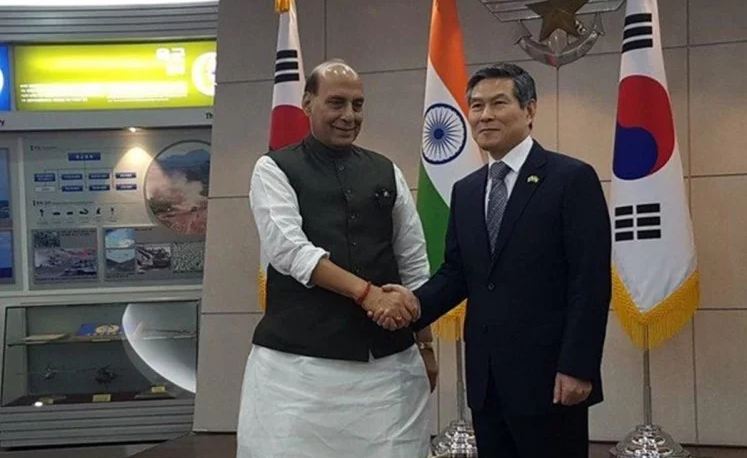Pakistan is all set to suffer another setback on Pakistan Occupied Kashmir (PoK) as South Korea has agreed that the government will not offer any ‘support or tax breaks’ to the companies operating in the region. As per a South Korean policy in 2014, the Korean government offers subsidies and tax breaks to the companies setting up units in foreign companies, but the policy has been changed and government support will not be applicable.
The decision was taken during defense minister-Rajnath Singh’s visit to South Korea. The defense minister also raised concern over China Pakistan Economic Corridor which passes through PoK. In a meeting with Prime Minister of the Republic of Korea Lee Nak-yon, he argued that CPEC violates India’s sovereignty, and expressed concern over South Korean companies’ projects in PoK. Singh is on two nation visit to South Korea and Japan.
In Korea, Rajnath Singh delivered a keynote address at the Seoul Defence Dialogue and talked about India’s commitments and efforts to bring peace on the Korean peninsula.
The history of Indo-Korean ties goes back to thousands of years. In fact, according to the legends, the Korean history starts with the marriage of a local prince to the princess of Ayodhya. Korea has good engagement with post-independence India and the subcontinent played an important role to end the Korean War. The Korean peninsula was divided into two parts after the Korean War (1950-53) and this resolution was sponsored by India, the ceasefire was declared on July, 1953.
The ‘look east policy’ and ‘act east policy’ of India has led to warmer relationship with South Korea. “India-Republic of Korea (RoK) relations has made great strides in recent years and has become truly multidimensional, spurred by a significant convergence of interests, mutual goodwill and high level exchanges,” said Ministry of External Affairs in a statement.
Former Indian president visited South Korea to initiate the talks on Comprehensive Economic Partnership Agreement (CEPA) which was operationalized in 2010. Civil Nuclear Energy Cooperation Agreement was signed by both countries in 2011 during then, Indian president Pratibha Patil’s visit to republic of Korea.
The next landmark in Indian relations with South Korea came during PM Modi’s visit to South Korea in 2015 when the bilateral relationship was upgraded to ‘special strategic partnership’. Indian trade relations with South Korea has grown exponentially in recent years and reached to 20 billion dollars in 2017.
Since CEPA was signed, bilateral trade between both countries has grown with double digit every year. Major exports of India to South Korea are raw materials including mineral fuels, oil distillates (mainly naphtha), cereals, iron and steel. On the other hand, South Korean exports to India are automobile parts, telecommunication equipment, hot rolled iron products, petroleum refined products, base lubricating oils, nuclear reactors, mechanical appliances, electrical machinery and parts, and iron and steel products. Samsung, Hyundai, Posco, LG and Kia are the major South Korean companies operating in India.
The country wants to enhance its relation with nations on the southern side of the globe through ‘new southern policy’ and India is one of the nations in its focus. The countries which have good relations with India like Japan, South Korea, and Australia are moving their major business operations from China to India.
